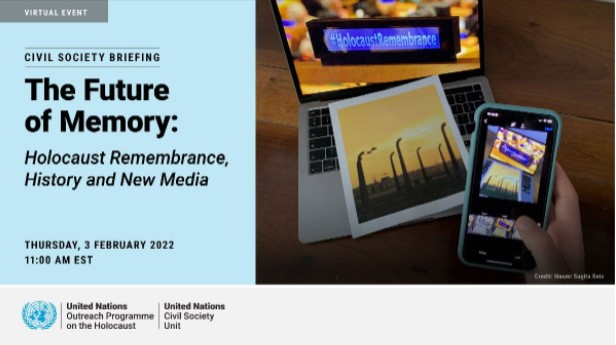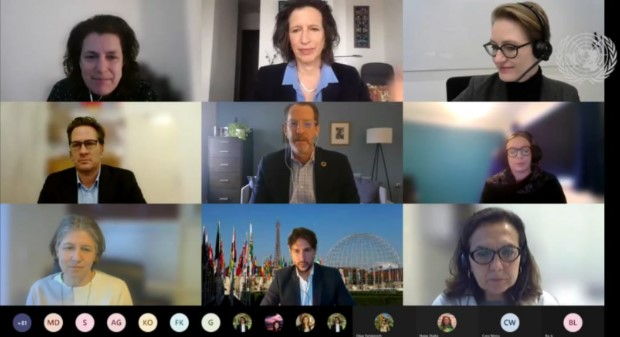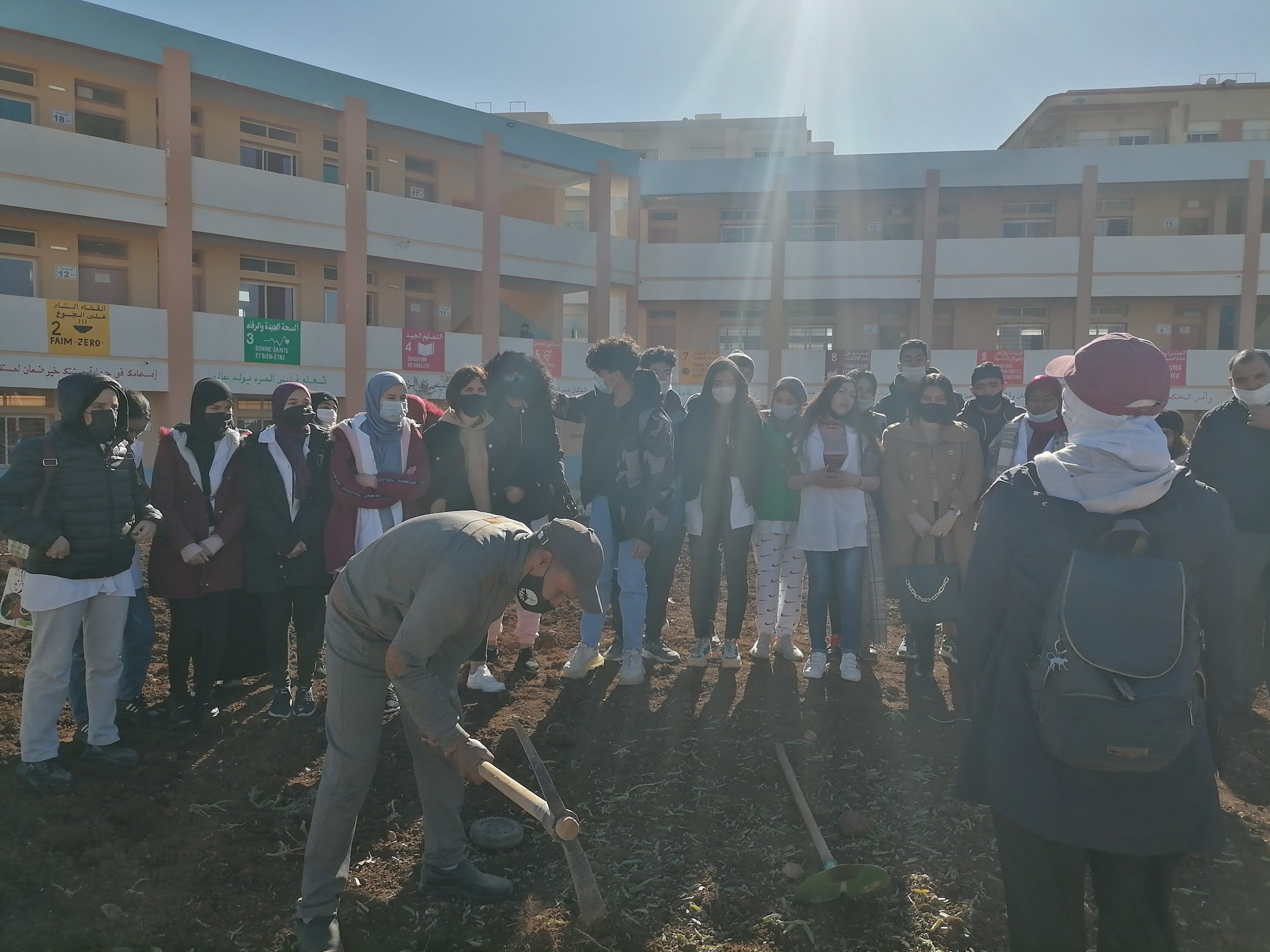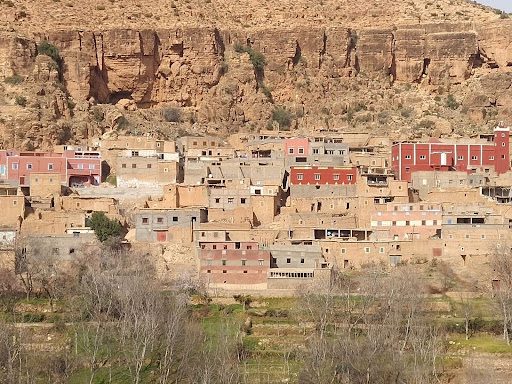By Amal Mansouri, Dakira Cultural Coordinator

Screenshot: Introduction to the Webinar Event, “The Future of Memory: Holocaust Rememrance, History and New Media
On February 3, 2022, a virtual event jointly organized by the United Nations Outreach Programme on the Holocaust and the United Nations Civil Society Unit was held under the theme “The Future of Memory: Holocaust Remembrance, History and New Media.” Participants from different parts of the world discussed the necessity of combatting Holocaust denial and educating the younger generations about the tragic events that took place during that era. Nowadays, the new media plays a fundamental role in our lives; its role is even more present in the younger generations’ lives. Therefore, to transmit this teaching to them, it is crucial and more effective to adapt the content and its presentation to the requirements of the different social media platforms. The speakers at the event were fully aware of that, and thus they shed light on how new media could be used to spread awareness about this topic and acknowledge the tragedy that the Jewish community experienced.
The event was opened with a wonderful speech delivered by Mrs. Tracey Petersen, the Manager of the Holocaust and United Nations Outreach Programme, in which she stated, “It is a global imperative to listen to and safeguard the memory of the victims of the Holocaust. It is critical for us and for future generations to remember what was lost and the terror that the victims suffered, so we never forget our responsibility to build a world in which such horrors and injustices have no place. Through remembering and protecting the historical integrity of the Holocaust, we give dignity to those who are denied this basic human right.” Following Mrs. Petersen’s speech, the moderator, Mr. Robert Skinner, Deputy Director and Chief of Partnerships and Global Engagement in the Department of Global Communications at the UN, opened the floor to participants to share their presentations and ideas about the subject.

Screenshot: Mrs. Tracey Petersen, Manager of the Holocaust and United Nations Outreach Programme, giving the opening speech during the webinar
In her opening remarks, Ms. Melissa Fleming, Secretary General of Global Communications at the United Nations, raised an intriguing point regarding the archives collected about the Holocaust. Ms. Fleming added “During the Holocaust, victims collected evidence of the terrorism, fully aware that they might not survive the genocide action. The archive could and must be preserved and transmitted. I think that, in a way, they knew that people would not believe the things that were happening to them. Those who were able to escape brought with them archival materials that provided evidence not only of the horrors of the Holocaust, but also of the vital cultural life that the Nazis were trying to destroy…Holocaust survivors established historical committees to protect the evidence gathered during the Holocaust.” Additionally, Ms. Fleming discussed how the internet represents a double-edged sword in disseminating these archives; instead of spreading the truth, there is a high risk that comes with the anonymous aspect of the internet that makes it easier for many people “to spread false information that can fuel racism, turn people against each other and lead to skepticism in humans.”
The presentations and discussions between the participants were very informative and rich. Each of them presented a set of projects and tools for preserving and transmitting Holocaust memory to current and future generations. Targeting different ranges of the global population, the projects themselves were very diverse and ranged from books, blogs, and participatory workshops (recording, re-circulating, and remixing testimonies, virtual reality, etc.) to Holocaust-themed video games, social media campaigns, and digital maps.
Through the discussion, it was very interesting to see how the projects adapt to the new situation caused by the Covid-19 pandemic. The projects were conceptualized in creative ways to keep up with the increasing importance of social media while continuing their mission of educating the global population about the Holocaust. The participants presented studies and the results of surveys about the most popular content on different platforms like Youtube, Facebook, Instagram, Twitter, and TikTok with a focus on the interactive platforms as tools that have led to the emergence of new forms of Holocaust comemoration. Accordingly, participants deliberated on various media projects and virtual awareness campaigns, like the #WeRemember campaign launched by UNESCO in partnership with the World Jewish Congress. Other virtual awareness campaigns have taken place on Instagram Live and Facebook Live, through online conversations with survivors and live testimonies, virtual tours, online readings of Shoah victims’ names, digital inquiries of historical objects and places, the TikTok-Shoah Commemoration & Education Initiative, virtual discourses, and websites against Holocaust destortion like againstholocaustdestortion.org
Retrospectively, Dakira and the Holocaust program have much in common. They both aim to record, transmit, and preserve the history of our ancestors, and most importantly, their goal is to reach out to and connect with the younger generations to educate them about the huge value of their cultural legacy. Thus, this event was an educational experience that taught us so much about creativity and emphasized how it is mandatory to examine our reality to develop solutions while using the appropriate tools that align with current circumstances and needs.
Amal Mansouri is a cultural coordinator for the USAID Dakira program and is currently based in Fes. Dakira, implemented by the High Atlas Foundation and its partners, aims to strengthen inter-religious and inter-ethnic solidarity through community efforts that preserve cultural heritage in Morocco.
This article was completed with the support of the United States Agency for International Development (USAID) and the High Atlas Foundation is solely responsible for its content, which does not necessarily reflect the views of the USAID or the Government of the United States






